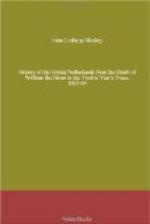Barneveld was inclined to take an even more gloomy view than that entertained by the French ambassador. He had, in truth, no reason to be sanguine. The honest republican envoys had brought no babies to offer in marriage. Their little commonwealth had only the merit of exchanging buffets forty years long with a power which, after subjugating the Netherlands, would have liked to annihilate France and England too, and which, during that period, had done its best to destroy and dismember both. It had only struggled as no nation in the world’s history had ever done, for the great principle upon which the power and happiness of England were ever to depend. It was therefore not to be expected that its representatives should be received with the distinction conferred upon royal envoys. Barneveld and his colleagues accordingly were not invited, with two hundred noble hangers-on, to come down the Thames in gorgeous array, and dine at Greenwich palace; but they were permitted to mix in the gaping crowd of spectators, to see the fine folk, and to hear a few words at a distance which fell from august lips. This was not very satisfactory, as Barneveld could rarely gain admittance to James or his ministers. De Rosny, however, was always glad to confer with him, and was certainly capable of rendering justice both to his genius and to the sacredness of his cause. The Advocate, in a long conference with the ambassador, thought it politic to paint the situation of the republic in even more sombre colours than seemed to De Rosny justifiable. He was, indeed, the more struck with Barneveld’s present despondency, because, at a previous conference, a few days before, he had spoken almost with contempt of the Spaniards, expressing the opinion that the mutinous and disorganized condition of the archduke’s army rendered the conquest of Ostend improbable, and hinted at a plan, of which the world as yet knew nothing, which would save that place, or at any rate would secure such an advantage for the States as to more than counterbalance its possible loss? This very sanguine demeanour had rather puzzled those who had conferred with the Advocate, although they were ere long destined to understand his allusions, and it was certainly a contrast to his present gloom. He assured De Rosny that the Hollanders were becoming desperate, and that they were capable of abandoning their country in mass, and seeking an asylum beyond the seas? The menace was borrowed from the famous project conceived by William the Silent in darker days, and seemed to the ambassador a present anachronism.
Obviously it was thought desirable to force the French policy to extreme lengths, and Barneveld accordingly proposed that Henry should take the burthen upon his shoulders of an open war with Spain, in the almost certain event that England would make peace with that power. De Rosny calmly intimated to the Advocate that this was asking something entirely beyond his power to grant, as the special object of his mission was to form a plan of concerted action with England.




